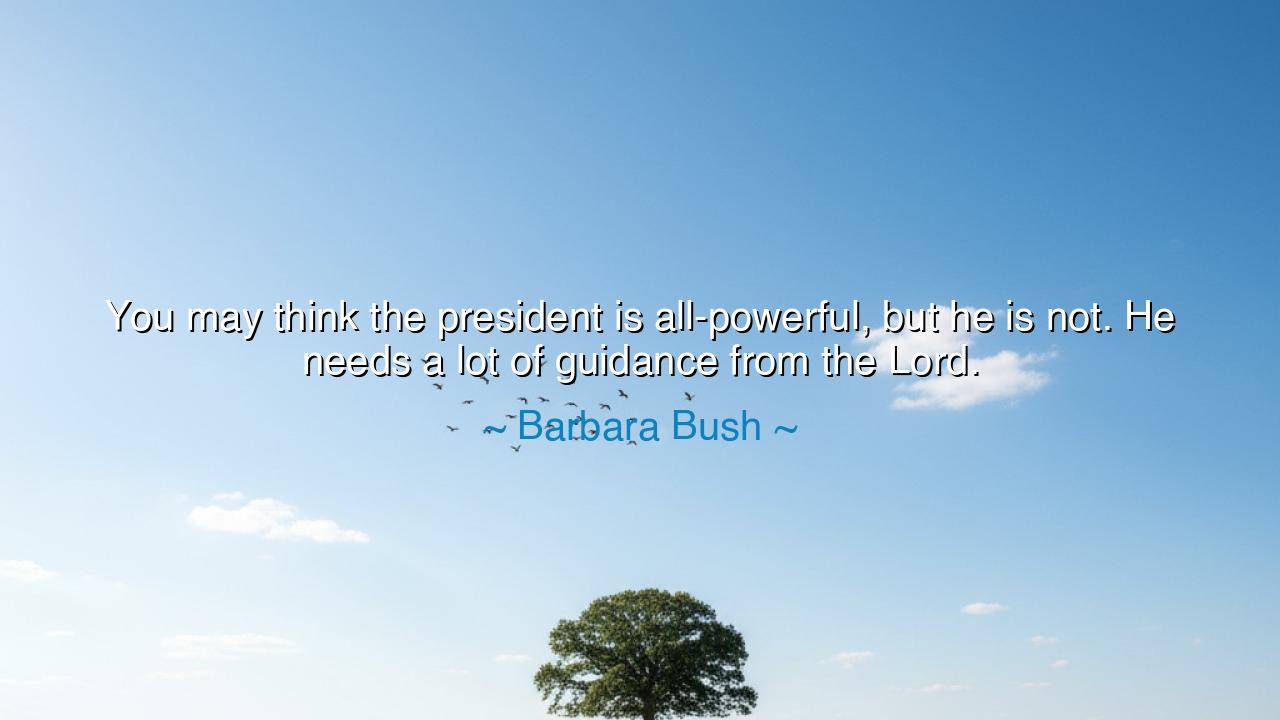
You may think the president is all-powerful, but he is not. He
You may think the president is all-powerful, but he is not. He needs a lot of guidance from the Lord.






Barbara Bush, the matron of America’s first family, once spoke with a voice of reverence and humility: “You may think the president is all-powerful, but he is not. He needs a lot of guidance from the Lord.” These words tear away the veil of illusion that cloaks the office of the presidency. For though the world imagines the president as sovereign and mighty, Bush reminds us that even the one seated upon the highest earthly throne is but mortal—finite in wisdom, fragile in strength, and ever in need of divine counsel.
The president, burdened with decisions that shape nations and generations, cannot rely on power alone. Laws, armies, and advisers may surround him, yet none can pierce the mystery of the future. Only humility, only recognition of a power greater than himself, can steady his hand when the weight of destiny presses down. Bush’s words are not a diminishment of authority, but a reminder that true leadership bows before the eternal.
Consider the tale of Abraham Lincoln during the Civil War. Torn by grief, battered by doubt, and surrounded by voices urging him to surrender or to crush without mercy, he confessed often that he sought guidance in prayer. In his Second Inaugural Address, he invoked the judgment of God as higher than the ambitions of men, reminding a fractured nation that human power could not resolve divine justice. His humility, his recognition of the limits of human will, gave him a strength beyond swords.
In every age, rulers who forget this truth fall into ruin. Napoleon, though a genius of battle, believed himself untouchable, a man of destiny beyond the reach of heaven. Yet his pride drove him into the snows of Russia and the defeat at Waterloo, showing that earthly might, without higher guidance, collapses under its own weight. Bush’s words shine here as wisdom: power without reverence is but folly disguised as greatness.
Therefore, O children of tomorrow, do not be deceived by the grandeur of office. Know that even the greatest among men is but dust, and the mightiest ruler still kneels before forces unseen. Let the words of Barbara Bush remind you that guidance is not weakness but strength, and that the leader who seeks counsel from the divine walks a steadier path than the one who trusts only in himself. For the highest power is not the power of man, but the wisdom of God.






Ttrung
How does Barbara Bush’s perspective on presidential power challenge the commonly held belief that political leaders should be omnipotent and infallible? Is it more humanizing to acknowledge that leaders, despite their authority, might still rely on external guidance? What role does faith play in decision-making for political figures, and does it help or hinder their effectiveness in office?
HTHuyen Tran
Does this statement suggest that even those in the highest positions of power recognize their limitations and need help beyond their own capabilities? If the president requires spiritual guidance, how does this affect our view of authority and decision-making? Should we be more open to the idea that leaders can be both powerful and dependent on faith to guide their actions?
LNLan ngth
How does the idea that the president needs guidance from a higher power shape our perception of political leadership? If leaders are expected to be guided by faith, how does this intersect with the secular nature of government? Is it reasonable to expect a leader to balance personal faith with their duties to a diverse, non-religious populace?
THHa Thi Thu Hoan
Is it possible that the president, despite holding immense power, is still vulnerable to forces beyond human control, such as fate or divine will? If Barbara Bush’s statement reflects her belief in the limits of human power, how does this influence our understanding of leadership? Should we expect our leaders to rely on higher guidance, or is this just a reflection of personal belief?
HKHoang Khanh
What does it say about the nature of power when even the most powerful leader in the world is seen as needing divine guidance? Does this imply that no one, not even the president, can navigate the weight of leadership alone? It raises questions about humility and the role of faith in leadership. How might this affect our expectations of political leaders and their relationship with spiritual or moral guidance?